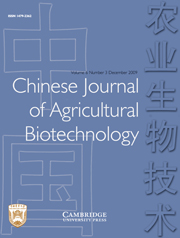Article contents
Differences of cytosine methylation in parental lines and F1 hybrids of Large White×Meishan crosses and their effects on F1 performance
Published online by Cambridge University Press: 12 February 2007
Abstract
In order to probe the effect of methylation on heterosis, the methylation-sensitive arbitrarily primed polymerase chain reaction (AP-PCR) technique was adopted to amplify pig genome DNA with 40 single arbitrary primers. The material involved parental lines and F1 hybrids of Large White×Meishan crosses. Nineteen differentially methylated sites with RsaI+HpaII digestion and 14 differentially methylated sites with RsaI+MspII digestion between parental lines and the hybrid were found. All fragments detected in this study were grouped into four classes: (1) the same level of methylation in both parental lines and the hybrid; (2) the same level of methylation in one parent and the hybrid; (3) an increased level of methylation in the hybrid compared to the parents, and (4) a decreased level of methylation in the hybrid. Five sites had significant effects on seven traits (P<0.05). Sequence analysis showed that three sequences had a high-identity match in GenBank (greater than 87%) and two sequences had no match in the database. The percentage of G+C in three sequences was over 50, and the observed/expected CpG of all sequences was above 0.6. Furthermore, one sequence contained G/C boxes. This study demonstrated that the sites in CpG islands within a gene promoter were differentially methylated in the hybrid compared to parental lines; methylated sites contributed differentially to F1 performance, showing that heterosis could benefit from either expression or repression of some genes.
Information
- Type
- Research Article
- Information
- Copyright
- Copyright © China Agricultural University and Cambridge University Press 2005
References
- 1
- Cited by

